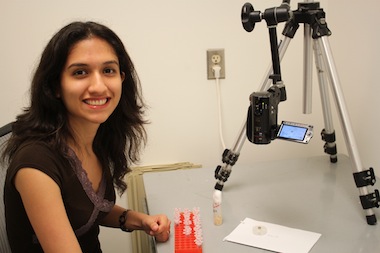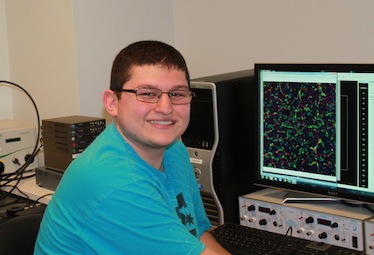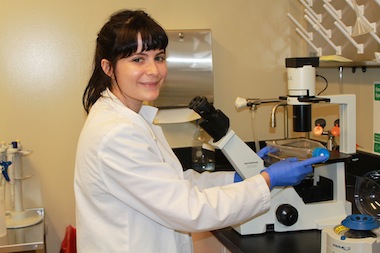Singing Fruit Flies, Alzheimer’s Diagnostics Among Student Projects
Ambitious Undergrads Spend Summer Making A Difference With Hands-On Research At UH
From seeking evolutionary clues through the courtship and survival habits of fruit flies to new diagnostics and treatments for Alzheimer’s and breast cancer, University of Houston (UH) undergraduate students are devoting their summer to serious research.
With a record number of 63 participants this year, the Summer Undergraduate Research Fellowship (SURF) program is open to UH undergraduates from all colleges and disciplines. SURF provides students with a concentrated, full-time research experience under the mentorship of faculty members, with each student receiving a $3,500 stipend. This year’s program started in early June and will be wrapping up Aug. 9.
Twenty-eight NSM majors are participating in SURF with 21 NSM faculty members hosting students in their labs.
Studying Exploration
While research on fruit flies may seem frivolous on the surface, study of these tiny insects actually reveals important clues about evolution and its implications. While there are obvious differences between humans and fruit flies, there are also many similarities at the level of genes and neurons that provide insight to certain behaviors in other animals, including humans.
Harith Al-Baldawi, a pre-med student majoring in biology and minoring in chemistry, became interested in studying exploration. Specifically, he is trying to understand how the brain recognizes new surroundings, which leads to exploratory behavior. To do this, he is taking advantage of the fact that hungry animals have increased rates of exploration that will help them find new sources of food. By mapping the brain regions and neurochemicals that control this, he says they will better understand how the brain influences exploration.
Working under the guidance of associate professor Gregg Roman in the Department of Biology and Biochemistry, Al-Baldawi says that decreases in exploration serve as an important measure of apathy, depression and anxiety. His research sets out to identify how the brain works to decide when to explore and when to stop exploring. In turn, he says, this will help them understand mechanisms that can guide further experimentation and treatment for these psychological states.
Adaptation to Environment

Fruit flies develop small wings in warm environments and larger ones in cool environments, presumably as an adaptation for flight at each temperature. However, males also use their wings to produce a courtship song to entice females. To determine if this difference in courtship song production translates into reproductive success, Perez is testing the mating success of males reared in both warm and cool temperatures.
“Understanding how well organisms can alter their development to cope with changes in key environmental variables allows us to understand more generally how well they can adapt to changing environments without genetic change,” Perez said. “Ultimately, this will allow us to better understand how quickly and how well they can adapt in general.”
Of the SURF program, both Al-Baldawi and Perez agree that having an opportunity to participate in the scientific process helps them better learn how science works. The chance to brainstorm with their mentors, make some of their own judgment calls and work independently gives them invaluable experience. Al-Baldawi says the experience has encouraged him to pursue research in addition to his dream of becoming a medical doctor, and Perez feels the opportunity has made her a more competitive candidate for applying to graduate school.
Preparation for Graduate School
Echoing those sentiments is mathematical biology major Steven Gregory, who said, “The SURF program has really helped me begin to prepare for graduate school. The lab has helped me connect many ideas from different areas of science, and the graduate students have taught me many experimental techniques that I can apply to my current and future research.”

He explains that it’s believed blood vessel damage is characteristic of Alzheimer’s disease. Using both diseased and normal brain tissue in their work, he says 3-D images are taken with a microscope of tissue stained for blood vessels and are then run through a program for analysis. The research team compares data from the normal and diseased tissue, giving their lab the ability to differentiate blood vessels in diseased tissue.
Targets for Cancer Therapy

Working with the protein MELK (Maternal Embryonic Leucine-Zipper Kinase), which has been found to play a role in cancer, the research team is working to inactivate MELK in breast cancer cells in order to observe the effects it has on TNBC cells. By identifying changed functions and affected proteins, they can then formulate hypotheses about how it affects the cell at the molecular level.
“This gives researchers a potential target for cancer therapy,” said Simon. “If MELK is essential to the division of cancer cells, then inhibiting it could inhibit and decrease tumor formation. Knowing what is affected by inactivating MELK will help researchers identify not only whether inhibiting it is effective, but also if it is safe. Down the line, if MELK suppression turns out to be a desirable therapy, it will decrease the amount of women dying from triple-negative breast cancer and provide a less hazardous treatment than conventional therapies.”
At the end of the program, the SURF students will be prepared to present research posters on their projects at UH’s annual Undergraduate Research Day Oct. 10.
- Lisa Merkl, University Communication